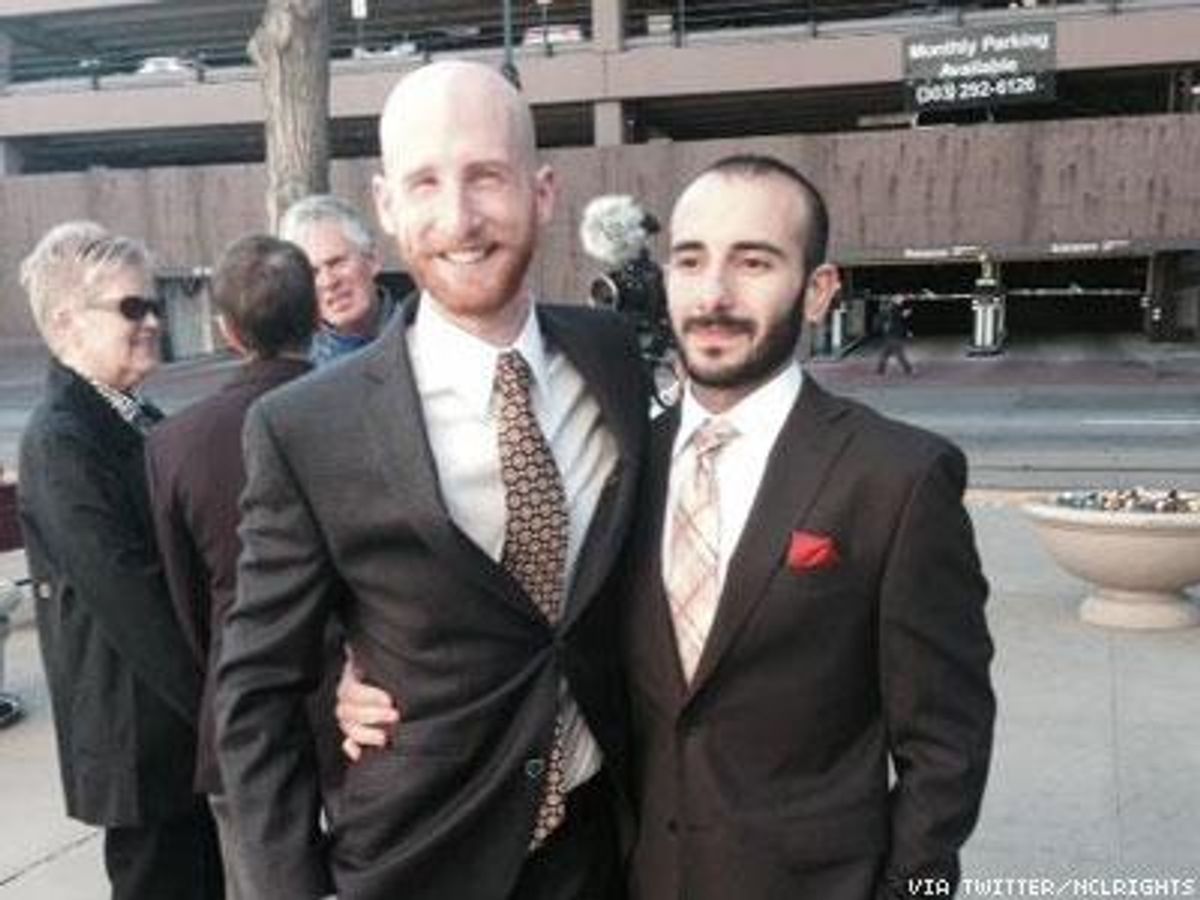Although reporters weren't allowed to cover live today's hearings in Kitchen v. Herbert, the case challenging Utah's constitutional ban on marriage equality, initial analysis from those inside the 10th Circuit Court of Appeals seems promising for anyone who supports the freedom to marry. Audio of today's proceedings is available here.
Court observers are hoping for a 2-1 ruling affirming the December decision of district judge Robert A. Shelby, which struck down the state's constitutional prohibition on marriage equality. Because Shelby's ruling did not include a stay -- and because the10th Circuit declined the state's request to put a stop to the same-sex marriages taking place immediately after that December 20 ruling, more than 1,300 same-sex couples were lawfully married in the 17 days before the U.S. Supreme Court granted the state's request for an injunction.
The Kitchen case, which is the first federal challenge to a state's constitutional ban on marriage equality to be heard at the appellate court level (although four other appellate circuits have marriage equality litigation pending) was presided over by a randomly selected three-judge panel at the 10th Circuit Court of Appeals at the Byron White Federal Courthouse in Denver. The judges included Paul J. Kelly, Jr., a Notre Dame graduate appointed to the bench by George H.W. Bush, Jerome A. Holmes, the circuit's first African-American justice appointed to the federal bench by George W. Bush, and Carlos F. Lucero, a Colorado jurist appointed by former president Bill Clinton, according to the Denver Post.
BuzzFeed's legal editor, Chris Geidner, was one of the first journalists out of the Denver courtroom following the conclusion of oral arguments shortly after 11 a.m. Mountain time.
"With two of the judges -- Lucero and Holmes -- focused intently on the discrimination claimed by the plaintiffs and the Supreme Court's history of recognizing marriage as a fundamental right, the hearing ended with the court appearing to lean toward agreeing with the trial court decision that the law is unconstitutional," writes Geidner. "Holmes, however, had tough questions for both sides -- and even suggested near the end of the argument that the court might not have the authority to hear the case."
First to address the court after the hearing began at 10 a.m. was Gene Schaerr, a D.C. attorney who left a prominent law firm to represent Utah's Republican governor, Tom Herbert, in this case, according to Geidner. Schaerr's argument focused heavily on whether a constitutional right to marry exists, citing previous Supreme Court rulings surrounding marriage from Loving v. Virginia to Zablocki v. Redhail. But Schaerr drew a distinction between what he called "traditional marriage," that he said involves one man and one woman, and the "redefining" of the institution to include same-sex couples.
"Marriage, as traditionally understood, is a fundamental right," said Shaerr, responding to a judge's question about whether there exists a fundamental right to marriage.
Another fundamental issue discussed at length in today's hearing was whether Utah's marriage statutes unlawfully single out a certain population for lesser and unequal treatment. Attorneys for the plaintiffs, three same-sex couples who live in Utah, said that the state's Amendment 3, passed by more than 60 percent of voters in 2004, denied Utah's gay and lesbian citizens access to the state recognition of their relationship. That denial is based solely on the gender of the people involved in the union, which is unconstitutional discrimination on the basis of sex, argued Peggy Tomsic, the Salt Lake City-based attorney who argued on behalf of the same-sex couples who filed suit.
Even Utah's Republican attorney general, Sean Reyes, seemed to acknowledge that the state's laws created a separate class of citizens who were not eligible for the same rights as others. Numerous outlets, including the Denver Post, reported that Reyes spoke directly with the plaintiffs in the case, apologizing for the grief caused by the state's laws and the ongoing litigation.
"We didn't create a second class of people to harm them," Reyes told the Post.
But as Eric Ethington points out at the New Civil Rights Movement, just last night, Reyes filed a motion with the Utah Supreme Court intended to put on hold all currently pending adoptions by same-sex couples in the state. Still, Reyes refused to discuss his personal opinion on the issue of same-sex marriage, and said that defending Utah's Amendment 3 was his job.
The New Civil Rights Movement also notes that nine federal trial courts have ruled in favor of marriage equality since the Supreme Court's landmark decision in June 2013's U.S. v. Windsor, which struck down a key section of the so-called Defense of Marriage Act. No federal court has issued a ruling opposing the legal right of same-sex couples to marry since that decision last summer.
The same three-judge panel will hear a similar case challenging Oklahoma's ban on marriage equality when it comes before the 10th Circuit next Thursday.



















































































Fans thirsting over Chris Colfer's sexy new muscles for Coachella